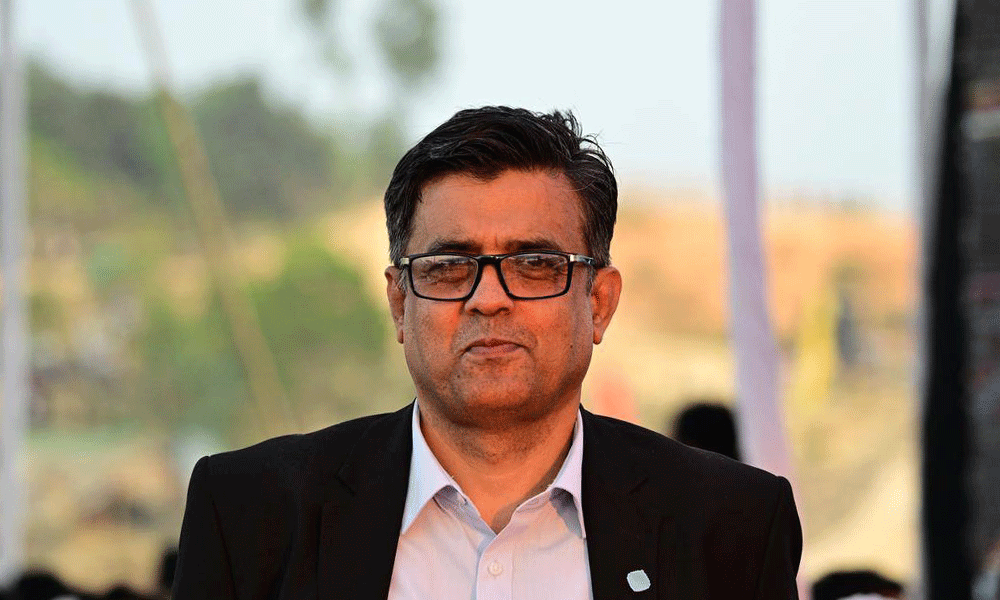Print: 28 Oct 2025
Shafiqul Alam, Press Secretary to the Chief Adviser, encouraged young journalists by saying, “Keep writing freely. The more you write, the stronger journalism will become. The more the government will learn from its mistakes, and the stronger democracy will be.”
He made these remarks on Saturday (May 3) at an event held at Alliance Française de Dhaka. The event was organized by Bangladeshi Journalists in International Media (BJIIM) to mark World Press Freedom Day.
In the first part of the event, Shafiqul Alam took part in a Q&A session with the audience on the state of media in Bangladesh following the mass uprising. The session was moderated by journalist Sharif Khiyam Ahmed.
The second part featured a panel discussion with six prominent journalists: M Abul Kalam Azad, Selim Samad, Ayesha Kabir, Omar Faruk, Muktadir Rashid, and Zayema Islam. The discussion focused on the evolving landscape and adaptation of journalism in Bangladesh.
BJIIM Convener Sam Jahan chaired the event, and introductory remarks were delivered by Muhammad Ali Majed, the organization’s Secretary General.
In his closing remarks, Sam Jahan said, “Perhaps for the first time—or at least after many years—World Press Freedom Day is being celebrated in Bangladesh with such significance. We are delighted to be part of this celebration.”
During the event, members applauded journalist Tasneem Khalil and his media outlet Netra News for recently receiving the Shorenstein Award from Stanford University.
Muhammad Ali Majed remarked, “Today our aim is to highlight the challenges journalism in this country has faced over the years, and also reflect on where we, as journalists, could have responded more ethically. Because press freedom doesn’t just mean being free from external influence—it also means being free from internal bias.”
Beh Lih Yi, Asia Program Coordinator at the Committee to Protect Journalists (CPJ), addressed BJIIM and Bangladeshi journalists, stating, “Your reports last year during some major national events kept the world informed. I hope this new era brings more freedom and opportunity for your work, and CPJ will stand by you in this journey.”
The event was attended by a broad spectrum of participants, including media professionals, rights activists, politicians, columnists, students, and members of the public. The event concluded with enthusiastic participation from all attendees.
More From Bangladesh
More From Bangladesh
More you write, govt will learn more from its mistakes: Press Secretary

Shafiqul Alam, Press Secretary to the Chief Adviser, encouraged young journalists by saying, “Keep writing freely. The more you write, the stronger journalism will become. The more the government will learn from its mistakes, and the stronger democracy will be.”
He made these remarks on Saturday (May 3) at an event held at Alliance Française de Dhaka. The event was organized by Bangladeshi Journalists in International Media (BJIIM) to mark World Press Freedom Day.
In the first part of the event, Shafiqul Alam took part in a Q&A session with the audience on the state of media in Bangladesh following the mass uprising. The session was moderated by journalist Sharif Khiyam Ahmed.
The second part featured a panel discussion with six prominent journalists: M Abul Kalam Azad, Selim Samad, Ayesha Kabir, Omar Faruk, Muktadir Rashid, and Zayema Islam. The discussion focused on the evolving landscape and adaptation of journalism in Bangladesh.
BJIIM Convener Sam Jahan chaired the event, and introductory remarks were delivered by Muhammad Ali Majed, the organization’s Secretary General.
In his closing remarks, Sam Jahan said, “Perhaps for the first time—or at least after many years—World Press Freedom Day is being celebrated in Bangladesh with such significance. We are delighted to be part of this celebration.”
During the event, members applauded journalist Tasneem Khalil and his media outlet Netra News for recently receiving the Shorenstein Award from Stanford University.
Muhammad Ali Majed remarked, “Today our aim is to highlight the challenges journalism in this country has faced over the years, and also reflect on where we, as journalists, could have responded more ethically. Because press freedom doesn’t just mean being free from external influence—it also means being free from internal bias.”
Beh Lih Yi, Asia Program Coordinator at the Committee to Protect Journalists (CPJ), addressed BJIIM and Bangladeshi journalists, stating, “Your reports last year during some major national events kept the world informed. I hope this new era brings more freedom and opportunity for your work, and CPJ will stand by you in this journey.”
The event was attended by a broad spectrum of participants, including media professionals, rights activists, politicians, columnists, students, and members of the public. The event concluded with enthusiastic participation from all attendees.





